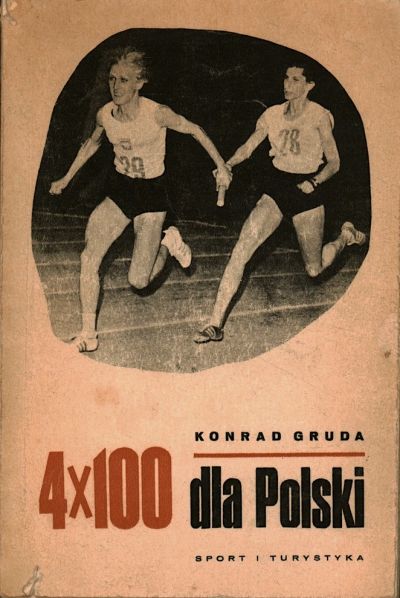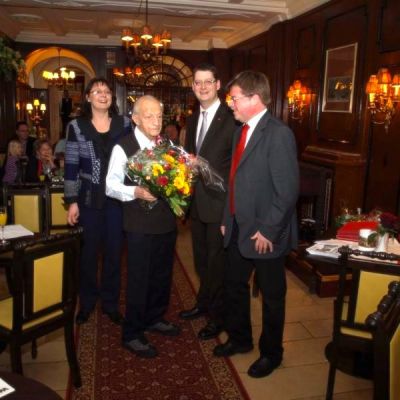Flexible in all systems. The many lives of Konrad Gruda

Following his arrival in the Federal Republic of Germany, he made attempts to obtain compensation as a subject of racial persecution, contacting the Frankfurt lawyer Natalia Rosenberg asking her to conduct research on the matter on his behalf. However, her enquiries with the International Tracing Service in Bad Arolsen failed to produce the necessary information[55].
He remained at least a minor subject of interest for the Polish secret service. During the early 1970s, an informant, “Henryk”, alias Bolesław Kierski, was deployed to spy on him – and on the entire circle of Jewish emigrés from Poland in the Federal Republic of Germany[56].
During his later life, Gruda played an active part in the cultural life of Wiesbaden, among other things as a collector of exlibris. He regarded himself as a decades-long member of the SPD, for which he received an honour in 2011[57]. He played an active role in supporting the founding of the Spiegelgasse Active Museum for German-Jewish History (Aktives Museum Spiegelgasse für Deutsch-Jüdische Geschichte), and he was also active in the Wiesbaden section of the German Alpine Club.
His work as a journalist was also the subject of an event held by the Mainz-Wiesbaden German-Polish Society (Deutsch-Polnische Gesellschaft Mainz-Wiesbaden) in 2002. He spent the final years of his life in Wiesbaden, remarried after the death of his wife Zofia, and continued to publish until the end. He died on 11 June 2012 in Wiesbaden. His daughter lives in New York.
Publications:
- (ed.), Przepisy sportowe pływania, skoków do wody i piłki wodnej, Warszawa: Wydawnictwo Ministerstwa Obrony Narodowej, 1952. 141 p.
- (ed.), Olimpiada z odniesieniem do domu. Reportaże, Wspomnienia, Opowiadania. Warszawa: Wydawnictwo Sport i Turystyka 1957. 192 p.
- (with Andrzej Roman), Droga do Tokio, Warszawa: Nasza Księgarnia, 1965. 224 p.
- 4 x 100 dla Polski, Warszawa: Sport i Turystyka, 1967. 261 p.
- Jej dzień, Warszawa: Twój Styl, 2001. 184 p.
- Der Torjäger, Göttingen: W. Fischer, 1974. 143 p.
- Zwölf Uhr einundvierzig. Ein Roman aus dem Jahr 2289, Wien/ München: Jugend und Volk, 1975. 222 p. (New edition entitled “Zwölf Uhr einundvierzig. Wird Jan der tödlichen Gefahr entrinnen?”, München: Arena 1979).
- Kein Sieg wie jeder andere. Sporterzählungen, Göttingen: W. Fischer, 1979. 239 p.
- (ed.), Spannende Geschichten, Berichte und Erinnerungen aus der Welt des Fußballs / vol. 1. Fußball, das ist ihr Leben! Göttingen: W. Fischer, 1980. 87 p.
- (ed.), Spannende Geschichten, Berichte und Erinnerungen aus der Welt des Fußballs, vol. 2: Tolle Tore, große Stars, Göttingen: W. Fischer, 1980. 96 p.
- (ed.), Deutschland vor, noch ein Tor. Spannende Geschichten, Berichte und Erinnerungen aus der Welt des Fußballs, Göttingen: W. Fischer, 1980. 175 p.
- Mount Everest. Auf Leben und Tod, Göttingen: W. Fischer, 1980. 247 p.
- (ed.), 100 Jahre Sektion Wiesbaden des Deutschen Alpenvereins: [1882–1982]. Festschrift. Wiesbaden: Sektion Wiesbaden des Deutschen Alpenvereins, 1982. 75 p.
- (ed.), Die dritte Halbzeit: 65 Leseabenteuer für Fußballfreunde, Bad Homburg: Limpert, 1985. 222 p.
- (with Hanna Abé, ed.), Das einsame weiße Segel. 35 Lese-Abenteuer für Segelfreunde, Bad Homburg: Limpert, 1985. 234 p.
- Der Slalomhang oder Der Hang zum Slalom, Wiesbaden: Die Stundenglas-Bücher, 1989. 235 p.
- Diese kleine Unsterblichkeit. Szenen einer Show. Roman, Frankfurt am Main: Fischer Taschenbuch Verlag 1995. 302 p. (pl. “Ta mała nieśmiertelność”, Warszawa: Rytm, 1997. 264 p.).
- Live und andere Erzählungen. Norderstedt: Book on Demand, 2011.
Markus Krzoska, September 2024
[56] IPN BU 00/170/644/5. Kierski (1920–2009), a construction engineer and Holocaust survivor, also operated under the cryptonym “Wyrwicz” and worked for the state security service from 1953–1989.
[57] https://www.spd-nord.de/2012/06/13/konrad-gruda/ (last accessed on 16/2/2025)). – The author wishes to thank Joanna de Vincenz for items of additional information.




![Konrad Gruda: Zwölf Uhr einundvierzig. Wird Jan der tödlichen Gefahr entrinnen?, München 1979 [1975] Konrad Gruda: Zwölf Uhr einundvierzig. Wird Jan der tödlichen Gefahr entrinnen?, München 1979 [1975] - Book cover](/sites/default/files/styles/width_100_tiles/public/assets/images/Konrad%20Gruda_Zwo%CC%88lf%20Uhr%20einundvierzig.%20Wird-Jan-der-to%CC%88dlichen-Gefahr-entrinnen.jpg?itok=z9Cru2Qk)




